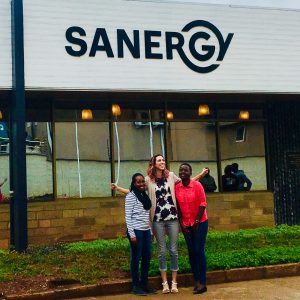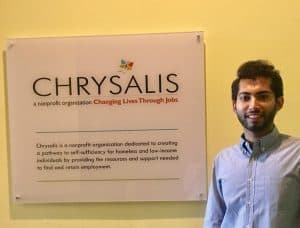MBA students put business skills to work at social enterprises
|
Each summer, Social Enterprise @ Goizueta co-invests with social enterprise partners to provide stipend funding that creates opportunities for MBA students to work with social enterprises as interns. We talked with Alanna Shuh, Hannah Wilson and Rhushi Bhadkamkar about their summer work in Atlanta, Los Angeles and Nairobi. See their responses below. |
 Alanna Shuh 19MBA
Alanna Shuh 19MBA
Good Measure Meals (GMM)
Atlanta, Georgia
Creating delicious, nutritious meals for all
What specifically are you working on?
“I’m helping GMM transition from a subscription and catering model to selling their ready-to-eat meals in micromarkets and a new cafe and farmers market in Grady Hospital. More specifically, I’m helping obtain the right licenses, ensuring labeling is FDA compliant and attention-grabbing, and building out the business plan.”
How does your work make an impact?
“GMM funds about 1/3 of all Open Hand meals- a sister nonprofit program. Through social enterprise, Open Hand can provide more medically-tailored meals to seniors and those that suffer from chronic disease and rely less on grants and philanthropy. The main work that I’m doing squares away the necessary regulatory components so that GMM can focus on creating delicious, nutritious meals for new customers via new sales channels.”
What have you learned that will make you a better social impact leader?
“I think that the main lesson I’ve learned is the importance of staying ahead of industry trends whether you operate in the nonprofit or for-profit space. GMM had the upper hand in providing ready-to-eat healthy meals for a while, but now they need to be sharper than ever to compete with the influx of healthy meal kits.”
 Hannah Wilson 18MBA/MPH
Hannah Wilson 18MBA/MPH
Sanergy
Nairobi, Kenya
Improving sustainable sanitation
What specifically are you working on?
“In addition to Sanergy’s “flagship” product (a standalone container-based toilet, the Future Initiatives team is piloting an in-home toilet offering and pit latrine emptying services, to be able to reach more of the market with affordable sanitation. I am helping this team manage and analyze data on these new products.”
How does your work make an impact?
“The Future Initiatives team realized that we will never reach the whole community with just one type of toilet, because everyone has different circumstances and preferences. So, my work helps us understand community preferences through data we have collected, and helps us prioritize our work efforts for new products in pursuit of safe sanitation for 100% of the community we serve.”
What have you learned that will make you a better social impact leader?
“Training and capacity-building are key. You can’t do everything by yourself, so you need to make sure your team has the skills they need to succeed past your project. In this role with Sanergy I’ve learned to focus on transferring my knowledge and skills to my coworkers, which will allow my contributions in this 3-month internship to be much more permanent for the organization.”
 Rhushi Bhadkamkar 19MBA
Rhushi Bhadkamkar 19MBA
REDF Farber Fellow at Chrysalis
Los Angeles, California
Changing lives through jobs
What specifically are you working on?
“Chrysalis is planning on expanding in Southern California outside of LA County later this year and is looking to understand the technology and business needs for that expansion along with the financial and implementation parameters needed for this growth.”
How does your work make an impact?
“Throughout the summer I have been developing a technology roadmap and a financial case to help Chrysalis understand the investment needed in order to grow and expand their successful homeless and low-income workforce development model in Anaheim, Orange County. Chrysalis’s main mission is to “Change Lives Through Jobs” through a combination of programmatic learning and transient employment through their social enterprises. By helping them understand the technological and business undertaking needed to grow, I am able to help them spread that mission across Southern California.”
What have you learned that will make you a better social impact leader?
“There were two main things that I will take away from working at Chrysalis this summer – firstly, there are multiple ways to measure impact and can vary based on the division in a non-profit. Tailoring the impact metric is important to show the value of a particular enterprise. Secondly, it is important to view and estimate social costs from a practical lens in order to truly differentiate social vs. business costs. Process inefficiencies can sometimes be lumped as a social cost making it hard for a business model to be viable.”
